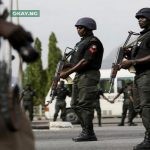Lateef Kayode Are, born in 1955, is a retired Nigerian Army Colonel, celebrated intelligence professional, and former Director General of the State Security Service (SSS). He has been named Ambassador-designate, adding a new chapter to a distinguished national security career spanning more than three decades.
Education and Academic Achievements
Master’s Degree in International Law and Diplomacy
University of Lagos, Nigeria — 1987
B.Sc. Psychology (First Class Honours)
University of Ibadan, Nigeria — 1980
- Best Graduating Student
- University Senate Prize
- Faculty of Social Sciences Prize
- Department of Psychology Prize
Nigerian Defence Academy (NDA)
Regular Combatant Course 12
- Commissioned Second Lieutenant in December 1974
- Ranked among the top ten cadets
Military Career
- Commissioned into the Nigerian Army in 1974
- Served as an Intelligence Officer in the Directorate of Military Intelligence
- Rose to the rank of Colonel
- Retired compulsorily from the Nigerian Army in 1993
His military career established his foundation in intelligence operations, counterintelligence, and strategic national security management.
Senior National Security Appointments
Director General, State Security Service (SSS)
May 1999 – August 2007
- Longest-serving DG in Nigeria’s history
- Served under Presidents Olusegun Obasanjo and Umaru Musa Yar’Adua
- Oversaw domestic intelligence, counterterrorism coordination, and national internal security strategy
Deputy National Security Adviser, Federal Republic of Nigeria
April 2010 – 2010/2011
Acting National Security Adviser
18 September 2010 – 4 October 2010
- Served briefly after the resignation of Gen. Aliyu Mohammed Gusau
- Coordinated national security policy during a transitional period
Professional Profile Summary
Lateef Kayode Are is a retired intelligence and national security strategist with over 33 years of combined military and civilian service. His eight-year tenure as the head of Nigeria’s domestic intelligence apparatus positioned him as one of the most influential figures in the nation’s modern security architecture.







